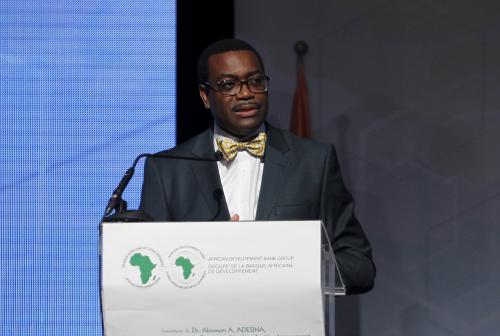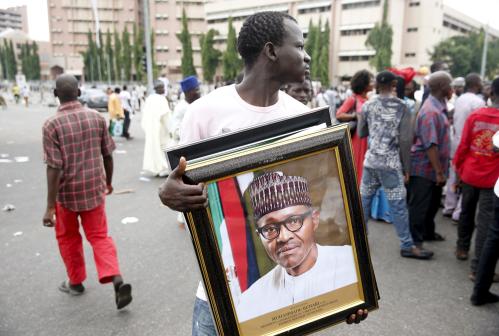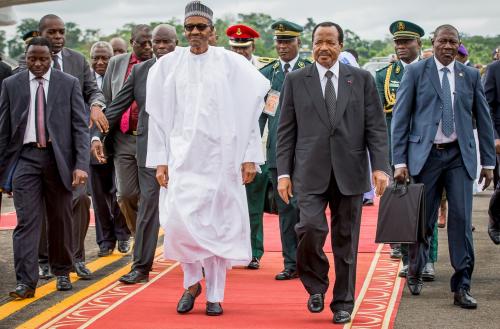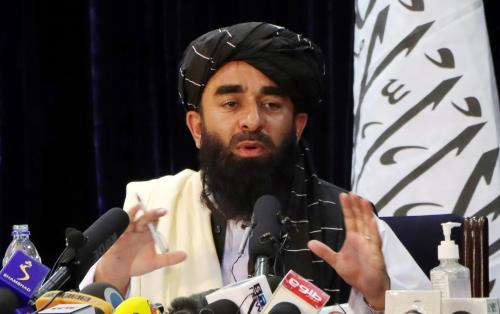The recent election of President Muhammadu Buhari of Nigeria has brought a wave of renewed hope and energy to the country. Buhari, often called Mai Gaskiya (“The Honest One”) by many Nigerians in the north, now not only leads the government after historically free and peaceful elections, but also carries with him an aura of “incorruptibility,” according to many Nigeria watchers. But, how realistic are these high expectations for a president facing Boko Haram, rampant corruption, shrinking government revenues, and widespread poverty? What can Nigerians and the international community practically expect from this new president? And what might be the best way for the United States to engage this new administration?
Last week, at an event entitled, “Nigeria in transition: Prospects and challenges for the new government,” the Brookings Africa Growth Initiative hosted Grant Harris, special assistant to the president and senior director for African affairs on the National Security Council; Rotimi Suberu, noted Nigerian political scientist and professor at Bennington College; and three former U.S. ambassadors to Nigeria, Princeton Lyman, Robin Renee Sanders, and Thomas Pickering, for a discussion on how the Buhari administration might tackle the myriad challenges it faces as well as how the United States’ approach to this important African country is shifting in light of the new administration. I had a one-on-one discussion with Grant Harris while Brookings Africa Growth Initiative Nonresident Fellow Witney Schneidman moderated the larger panel.
U.S.-Nigeria relations
Harris began the discussion with the Nigerian elections, the apprehension many felt in the United States about the prospect of instability or election-related violence, and how the U.S. undertook strong measures—such as a personal appeal from President Obama—to encourage peace. Calling Nigeria an “indispensable partner,” Harris emphasized that the U.S. views Nigeria not only a strong ally in the fight against terrorism, but also as a critically important economic player. While many critics of the U.S. government believe it is Nigeria’s oil that keeps the United States interested in the country, during the event, Harris countered this belief, stating, “We don’t have any policy in favor or against of buying oil from a country like Nigeria or elsewhere, it’s really market factors that have driven the reduction of U.S. imports of Nigerian oil … And even as we’ve seen our imports dramatically decreased, our concern about the situation in Nigeria, our view that Nigeria should be a very important regional leader, and our view about the importance of the relationship is in no way diminished.”
“I think we need to recognize that [Buhari] probably knows where he wants to go, and he’s very clear on his Buhari doctrine. What we need to do as friends of the nation is really support him in his efforts to get there.” – Robin Renee Sanders
Governance and corruption
According to many Nigeria experts, corruption and governance seem to be two policy obstacles that Buhari might have significant success in tackling. In fact, as I stated during the event, Credit-Suisse released a report on the likelihood to which Buhari and his party can deliver on their campaign promises. The odds are low for six of 10 major policy priorities—economic growth, job creation, social economic development, public finances, food security, and economic infrastructure—but the odds are high for three—security, corruption, and governance.
This point was not lost on the panel, where Suberu emphasized Buhari’s “incorruptible” credentials. Suberu’s optimism, however, was tempered and cautious, noting that it is imperative that “Buhari goes beyond personal example to implementing some institutional reforms and building the institutions for fighting corruption.” While anti-corruption was a centerpiece of his campaign, this is Buhari’s fourth attempt at the presidency and his coalition, unfortunately, includes a lot of politicians that are known to be very corrupt. In addition, the institutions for fighting corruption in Nigeria are also very weak. Lyman went further, stating that security and corruption are likely to be Buhari’s biggest challenges, namely due Boko Haram and the depth to which corruption exists in the country.
Economic development and oil
Oil and economic development were also major themes during the event. With the price of oil falling, Nigeria’s economy has been suffering, as over 70 percent of government revenue comes from that sector. In addition, much of the corruption in Nigeria is found in the oil sector, and, though a recent audit found no wrongdoing, many experts are skeptical of those findings. Sanders recommended that Buhari redo the oil audit—the auditor, PricewaterhouseCoopers stated both trouble verifying the authenticity of some documents and failure to access to some officials—as well as heighten the president’s role in oil management. Pickering agreed, noting that sound Nigeria watchers have hinted that the president will also make himself minister of petroleum (a job he has held in the past). The Nigerian National Petroleum Corporation was a related topic of discussion: There have been calls to privatize the company, a move Sanders advised as unwise so early in the game, instead strongly recommending, again, that a new oil audit is necessary before any major decisions can be made.
“I think the key, now, though is that President Buhari appoints the right people for these senior positions, especially the economic portfolios, to have the technocratic skills and the ability, really, to undertake the right policy reforms.” – Grant Harris
In terms of the Nigerian economy, Sanders, was keen to identify agriculture and small and medium enterprises (SMEs) as important sectors for potentially massive gains. About 80 percent of Nigerians work in agriculture, a point not lost on President Buhari, as agriculture features prominently in his 100-day plan. Sanders, however, had strong doubts about the private sector’s willingness to invest in SMEs and agriculture: “Yes, the private sector is important but I really think that it’s more than what the private sector can do unless they are looking at doing vocational training, entrepreneurial training—and that’s not what they’re looking to do.”
Security
Security is a top priority for the U.S. when it comes to Nigeria: The United States views the country as vital ally in the fight against terrorism in general and Boko Haram in particular. Indeed, defeating Boko Haram and is undoubtedly one of Buhari’s tallest orders. The U.S. has done much to support Nigeria in this space, and Harris emphasized that this “security support” goes beyond the basic understanding of military backing and training, but, rather, encompasses a wide variety of resources, including judicial-related training, intelligence, surveillance, reconnaissance, and victim support. He also expressed grave concern over recent allegations of human rights abuses by Nigerian soldiers. Lyman, though, pushed harder, calling a recent Amnesty International report “damning,” and appealed for more stringent use of the Leahy process—the vetting procedure by which the United States determines that military officers it is assisting have not committed any human rights violations—by both the U.S. and the Buhari administration. Though that vetting system might reduce numbers, Pickering agreed, stating, “I think one really quite capable military unit is better than 30 bad ones that are in fact recruiting tools for Boko Haram.”
Another major theme regarding security was that tackling Boko Haram recruitment includes community support and economic development, especially in the northeast. Harris emphasized, “As you prosecute the war against Boko Haram you’ve got to think about how you then support the communities, how do you draw people away from Boko Haram as a group and how you provide jobs and economic growth to make the situation all the more stable over the long term.” Similarly, Sanders mentioned that security reform includes support to internally displaced peoples, human rights support for victims, trauma rehabilitation, and many other services, citing the Presidential Initiative for the Northeast (PINE), created by the Jonathan administration, as a successful example of this type of institution.
“And I think you’re absolutely right, what are the untapped resources? Well primarily it’s the Nigerian people. It is by far, in my view, one of the most dynamic and creative countries that I’ve ever had a chance to survey.” – Robin Renee Sanders
Overall, the panel seemed optimistic for the future of Nigeria and U.S.-Nigeria relations, though many approach the new administration measured expectations. As the panelists pointed out, Nigerians are expecting a lot from this president: A few of the panelists had observed the celebrations on the street during Buhari’s inauguration first-hand, and many Nigeria experts believe that hope has been renewed. Harris, though, emphasized a point with which many Americans are familiar with: Expectations for new presidents can be exceedingly high, possibly passing the capability of anyone in that office. For Buhari to succeed, he needs to select the right, qualified people for leadership positions and stay true to his agenda.
The Brookings Institution is committed to quality, independence, and impact.
We are supported by a diverse array of funders. In line with our values and policies, each Brookings publication represents the sole views of its author(s).







Commentary
Analysts and policymakers discuss challenges confronting Nigeria’s new government
June 19, 2015